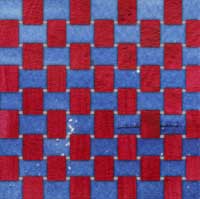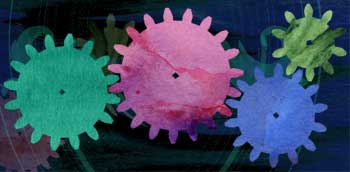>(In which I teach myself about mistakes and achieve a long term goal of illustrating my blog.)
Sometimes, when I’m painting, I make a mistake. That could mean an involuntary movement of hand or brush makes a mark I don’t expect. It could mean that I intentionally make marks that, on reflection, I don’t like and wish I hadn’t done. If I notice right away, I sit and stare for a moment. Other times, my eye keeps being drawn back to the problem area like a tongue checking to see if a tooth is still sore. The way I paint (acrylic paint used transparently), there is no way to cover it up. What to do?
Oddly, I have discovered that repeating the mistake in other areas of the painting integrates it into the piece, allows me to continue painting and sometimes moves the painting in a new direction. Are there life lessons hidden here?
The two kinds of mistakes I experience while painting help me understand what happens in “real life.” Sometimes I make a mistake. I consciously take action. It seems like a good idea at the time, but it turns out not to be. I regret it. I wish it could be undone. Other times, outside influences affect me in unexpected ways and “mistakes are made.”
I thought I might write about Overcoming Mistakes, but I didn’t like the image of triumph it conjured. I wanted a word with more accommodation built into it. I have been playing with alliteration. In the thesaurus, I found the word “mesh.”
While I love the slithery sound of the word, I was a bit worried by the idea of becoming enmeshed in mistakes. I switched to the dictionary to investigate the word.
It can be a noun, of course.
- any knit, woven, or knotted fabric of open texture.
- an interwoven or intertwined structure; network.
- any arrangement of interlocking metal links or wires with evenly spaced, uniform small openings between, as used in jewelry or sieves.
- one of the open spaces between the cords or ropes of a net.
It can also be a verb and (when used without an object) has these meanings:
- to become enmeshed.
- machinery: to become or be engaged, as the teeth of one gear with those of another.
- to match, coordinate, or interlock.
So what can I learn by pairing the words mesh and mistake?
Weaves, knots and open spaces
 In a weave, crisscrossing threads take their turns going over and under. There is order. There are spaces. The purpose of a weave is to make a fabric that covers or protects.
In a weave, crisscrossing threads take their turns going over and under. There is order. There are spaces. The purpose of a weave is to make a fabric that covers or protects.
As Hannah Montana points out, everybody makes mistakes. Mistakes are part of my daily life. When they happen, they feel more like knots: tight, tangled, constricting. When I make a mistake (especially in more functional areas of my life), the mistake feels huge. One mistake reminds me of all its ancestors and my life looks like the one unbroken lineage of mistakes.
It’s not, of course. The threads of mistakes cross my life, but they are not the whole cloth. I need to move into the open spaces in the cloth. I need to relax. Mistakes are part of the weave and perhaps, unyielding and wiry as they are, they make it (and me) stronger.
Be engaged, not enmeshed.
My initial discomfort with the idea of becoming enmeshed in mistakes is valid. if I hang onto my mistakes and become obsessed with them—even obsessed with fixing them— I will not escape them.
Better to become engaged with my mistakes, like the gears in a machine. The teeth in a gear are, like my mistakes, pointed and unyielding. Those are precisely the characteristics that allow it, when engaged, to push another tooth forward. A the gears push against each other in a rhythm of engagement and release, the machine moves.

Meshing with Mistakes
When I started writing this post, I imagined that for each meaning of the word “mesh”, I would find a lesson for myself. As I wrote, paragraphs kept ending with the same lessons. I am left with these simple thoughts:
- Mistakes, whether made voluntarily or thrust upon me, are part of my life. Expect them.
- Notice the open spaces. Linger in them. Treasure them.
- Play with the possibility that mistakes are (a) making me stronger and (b) moving me forward. (It may or may not be true, but pretending it is will help my attitude.)
I don’t think purposefully repeating mistakes will let me integrate them more gracefully into my life. Perhaps, though, remembering the lessons of the mesh will allow me to move over and under obstacles more easily.

